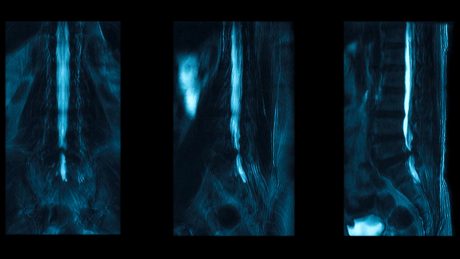Stewarts acted for DS, a practising lawyer in his fifties, in a clinical negligence claim regarding a delay in diagnosing and treating a spinal infection, which was incorrectly diagnosed as lung cancer. A substantial settlement was achieved without the need for initiating court proceedings.
Incident
In October 2018, DS experienced cold sweats, shivers and chest pain. His GP referred him to his local NHS hospital under the two-week cancer referral pathway. Later that month, the pain had become constant, severe and localised around the centre of his back.
In November 2018, DS underwent a CT scan of his thorax, abdomen and pelvis at his local hospital. The scan showed a mass in the right lung, invading his spinal vertebrae. This led to an incorrect diagnosis of primary lung malignancy. Despite his blood results showing a staphylococcus aureus infection, DS was discharged without antibiotics to await a biopsy in three weeks.
DS’s back pain became unbearable, and a couple of weeks later, DS suddenly lost power in his legs and could not stand up. On admission to A&E, his inflammation markers and temperature were very high, so he was started on the sepsis pathway and received IV antibiotics.
An MRI scan of the spine showed spondylodiscitis (an infection and destruction of the intervertebral discs) and an abscess causing spinal cord compression. DS was informed that the mass found on the scan earlier that month was an infection, not lung cancer. He underwent emergency surgery to decompress his spinal cord and drain the abscess.
In January 2019, DS underwent spinal fixation surgery due to the damage caused to his spine.
DS was left with minimal power in his legs, such that he is now largely reliant on a wheelchair. He was unable to return to his family home due to the steps at the property.
Legal case
DS’s claim was taken on by Stewarts in May 2019, with Stewart Young, a senior associate, having conduct of the case.
Independent expert evidence was obtained from a neurosurgeon, respiratory physician and radiologist. The experts were of the opinion that the hospital should have considered an infection as the likely diagnosis, which should have been confirmed with an urgent MRI scan. A prolonged course of antibiotics would have prevented the abscess development, spinal cord compression and paraplegia. A Letter of Claim was sent to the hospital trust.
A Letter of Response was received within four months admitting liability for negligently causing DS’s paraplegia. The trust also sent a letter of apology to DS.
Interim damages payment
Stewarts negotiated a £650,000 interim damages payment following the admissions, which enabled DS to purchase a bungalow and regain some of his independence while the case was valued.
Settlement
Stewarts worked collaboratively with the defendant to quantify the case swiftly with a view to holding a joint settlement meeting in late 2021 to try and settle the case without the need to issue court proceedings.
To fully assess DS’s needs for the rest of his life, Stewarts obtained six expert reports in the fields of spinal rehabilitation, care/occupational therapy, physiotherapy, psychology, accommodation, and forensic accountancy regarding DS’s loss of earnings and pension claim.
The settlement negotiations took place remotely via Zoom. Stewarts instructed a barrister, Stephen Glynn. The multiple virtual breakout rooms allowed DS to have confidential talks with his legal team throughout the day. From the outset, the defendant was apologetic for the poor standard of care given to DS and showed a willingness to compensate him fully for the devastating impact his injuries had had on his life. After several rounds of negotiation, the claim settled for a lump sum of £3,.75m. This settlement was achieved within two and a half years and without the need to commence court proceedings.
The settlement will ensure DS is able to make suitable adaptations to his home so he can live as independently as possible. He is now able to pay for a care package as his needs will increase with age. He will also be able to reduce his working hours so that he can focus on rehabilitation. Hopefully, this will help him reach his goal to accompany his daughter down the aisle at her wedding without the aid of his wheelchair.
Comments from DS
“I cannot thank Stewarts enough for the professional and proactive way they litigated my case.
“As a lawyer myself it was hard initially to resist the temptation to involve myself in the legal detail of the case, but it became quickly apparent that I was in expert and professional hands. I could trust them to get on with the job whilst I concentrated on my own rehabilitation.
“Thanks to the settlement achieved by Stewarts, I now have the opportunity to get the maximum out of my new life, and to pick up on hobbies and aspirations that had seemed almost impossible in the aftermath of such a life changing injury.”
You can find further information regarding our expertise, experience and team on our Clinical Negligence pages.
If you require assistance from our team, please contact us.
Subscribe – In order to receive our news straight to your inbox, subscribe here. Our newsletters are sent no more than once a month.





